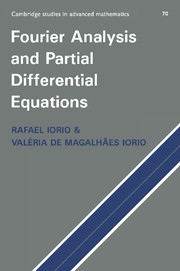Preface
Published online by Cambridge University Press: 05 July 2014
Summary
This book is the outcome of several courses and seminar talks held at the Instituto de Matemática Pura e Aplicada (IMPA) over the years. It is a greatly modified version of a previous work by the authors, Equações Diferenciais Parciais, Uma Introdução, (Projeto Euclides, IMPA, 1978). It has a twofold purpose, namely to introduce the student to the basic concepts of Fourier analysis and provide illustrations of recent applications where these concepts were used to study various properties of the solutions of some important nonlinear evolution equations.
The text is divided into three parts. The first one, containing Chapters 1 to 3, deals with Fourier series and periodic distributions. Chapters 4 to 6 belong to the second part, which contains applications of Fourier series and periodic distributions to partial differential equations. Chapters 7 and 8, in the third part, are more advanced and deal with some nonperiodic problems.
Chapter 1 presents some very classical material on PDEs, such as classification into types, separation of variables and maximum principles for the heat and Laplace equations. It is by no means a comprehensive account of such topics. Rather, it's purpose is to establish the basic language used throughout the work and to provide a collection of definitions and results needed in the remainder of the book. The following two chapters deal with Fourier series and some of its applications, first in a classical setting and then in the scenario provided by p′, the space of periodic distributions.
- Type
- Chapter
- Information
- Fourier Analysis and Partial Differential Equations , pp. ix - xiiPublisher: Cambridge University PressPrint publication year: 2001



